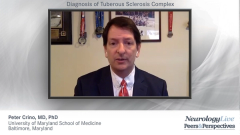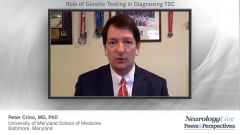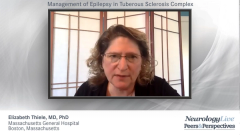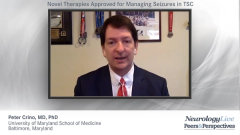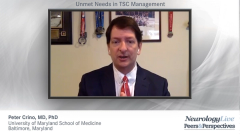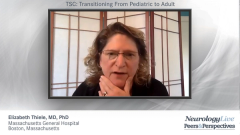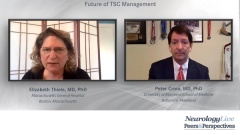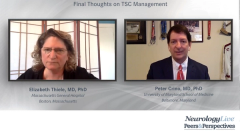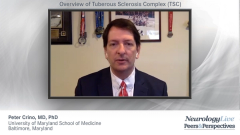
Role of Genetic Testing in Diagnosing TSC
Experts in neurology discuss recommendations for genetic testing when approaching the diagnosis of TSC and misconceptions around cognitive impairment.
Episodes in this series

Elizabeth Thiele, MD, PhD: How do you view the role of genetic testing? It’s clearly important for prenatal family planning and for testing family members. If you see a 50-year-old with TS [tuberous sclerosis] and with no children, what’s the role of genetic testing for that person?
Peter Crino, MD: It’s nice to have genetic testing in the background. When we started doing this years ago, not only did we not have the genes, but we also didn’t have genetic testing. Now we do. It’s pretty easy to order, and it’s pretty user-friendly for patients. I hold that in the back burner if I can assemble a clinical diagnosis for a patient. The recommendation now is that if you screen a patient and you have a clearly pathogenic—meaning a clear disease-causing mutation in either TSC1 or TSC2—that is also a diagnostic criterion for tuberous sclerosis complex [TSC]. If I have someone who comes in who’s got a bunch of minor things that just can’t come together with the major thing, the genetic testing can be the capstone on that and can help me solidify the diagnosis. For the vast majority of patients, with an assiduous clinical exam and using imaging, I can usually make a diagnosis.
I’ve had a couple of challenging cases over the years with adults who have had a single cortical dysplasia on their brain MRI. I cleverly get an abdominal MRI, and I find a couple of renal cysts, which are minor diagnostic criteria. Now I’ve got someone with cortical dysplasia, which could be a major criterion, and a couple of renal cysts, which is a minor criterion. That’s still possible TSC. If that person is of childbearing age, knowing that they have TSC is very important, in terms of family planning, follow-up, surveillance, and prognostication. In that situation, I find genetic testing is very useful. We’ve also done genetic testing and identified individuals with TSC who’ve wanted to know, and other family members, do others have this mutation? As many may know, TSC is a dominant disease, which means there’s no “carrier state.” So you either have this mutation, and therefore have this syndrome, or you do not. Other people have some soft signs on skin exam, so genetic testing looking at an individual plus sibs or something can be very useful.
Elizabeth Thiele, MD, PhD: The genes are also included on different oncology panels. I’ve had a couple of people come to me who were diagnosed when a family member had renal cell carcinoma or something and they had a gene panel that showed the mutation.
Peter Crino, MD: Correct.
Elizabeth Thiele: We sometimes have difficulty getting payer coverage, particularly in adults, particularly to cover genetic testing. Until now, and even now, treatment doesn’t differ between TSC1 and TSC2. But with evolving genetic therapies, not yet for TS but maybe in the future, it’s going to be more important.
Pete, you and I are both neurologists. The brain is what got us to the TS world. One of the things I still see often, and you probably do as well, is that a lot of medical professionals and people who read the internet assume that everyone with TSC must be cognitively impaired. That’s 1 of the things I’ve been very impressed by. You and I both know, and it’s important to stress, that 50% of people with TS are cognitively normal. In fact, I take care of a lot of people with TS who are much smarter than I’m ever going to be.
Peter Crino, MD: Indeed.
Elizabeth Thiele, MD, PhD: Don’t you find that there’s still an issue? Many of our colleagues even expect people with TS to have cognitive impairments.
Peter Crino, MD: Absolutely. It’s 1 of the sad bits of history that just can’t seem to go away, which is the idea that TSC is irrevocably associated with severe intellectual disability, autism, and severe epilepsy and that it’s viewed as a catastrophic syndrome. I’ve never had a child with tuberous sclerosis, but I am a father. I can imagine that a new parent, who’s told that their child has tuberous sclerosis, could go to the internet and get the wrong source, reading about intellectual disability—using old terms like mental retardation, epilepsy, and autism—must be devastating for families.
The truth is that the numbers don’t look anything like that. It’s much more like 50%. As you say, lots of individuals have normal cognitive function and have very limited TAND [TSC-associated neuropsychiatric disorder] burden. They may not have epilepsy and are living, working, functioning, going to college, and living normal lives in society. In that scenario, tuberous sclerosis complex is more of a chronic disease the way other chronic diseases might be, such as diabetes or lupus or other kinds of disorders, which require medical surveillance, for sure, but don’t have the burdens of intellectual disability or autism. It’s important to get the right information to people so they know what the data look like and what they might be able to expect over time.
Elizabeth Thiele, MD, PhD: You were talking about your oldest patient with TS. My oldest patient TS now is 88. He did me a favor a couple of years ago and stopped shoveling his own snow. I was always very worried about this 88-year-old shoveling snow. Whenever I was shoveling my snow, I was thinking about him. It’s so important for people to know.
I’d like to thank the audience for watching this Neurology Live® webinar. If you enjoyed the content, please subscribe to our e-newsletters to receive upcoming programs and other great content right in your in-box.
Transcript Edited for Clarity
Newsletter
Keep your finger on the pulse of neurology—subscribe to NeurologyLive for expert interviews, new data, and breakthrough treatment updates.

